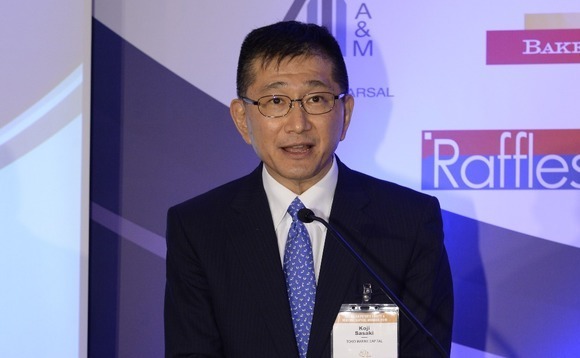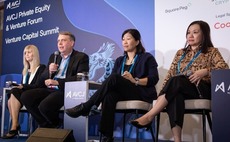
AVCJ Awards 2015: Exit of the Year - Mid Cap: Bushu Pharmaceuticals

Tokio Marine aimed to awaken the ambition of Japan’s Bushu Pharmaceuticals and show how a good GP can turn companies around. A 6x return was its reward
When Koji Sasaki, president and managing partner of Tokio Marine Capital, looks back at his firm's four-year investment in Japan's Bushu Pharmaceuticals, he sees two transformational success stories. One occurred in the world of private equity, the other in the Japanese pharmaceutical industry. Tokio Marine played a role in both.
At the time of the PE firm's acquisition of Bushu in 2010, it was a subsidiary of pharmaceutical developer Shionogi & Co. The company had begun in 1998 as an independent contract manufacturing organization (CMO), and although it had some other clients, Shionogi dominated the production lines.
"About 45% of their sales depended on their parent, prior to our investment," says Sasaki. "Their main task was to make a stable and high-quality product on behalf of Shionogi. But Bushu had little incentive to actively explore and expand to other customers."
The GP suspected there was potential in Bushu that was going to waste. With Shionogi as its owner, the manufacturer had to limit its associations to those clients that received parental approval. If it could become fully independent once again, rival drug manufacturers such as Takeda, Daiichi Sankyo and Astellas would no longer be off limits.
Japan's CMO sector had begun to take off following the passage of the Pharmaceutical Affairs Law in 2005, which opened the door to full outsourcing of drug production. An underperforming manufacturer was the perfect entry point into the rising market.
A strategy re-thought
With this goal in mind, Tokio Marine paid JPY8.56 billion (then $93 million) to acquire a 100% stake in Bushu. The new owners set about re-focusing management from addressing a single major client to aggressively courting and winning contracts on a neutral and independent basis.
"They were very sincere and honest people, but they were not aggressive," Sasaki remembers. "We wanted to change the management philosophy from a heavily operation-oriented to a more entrepreneurial mindset."
One of the principal tools to accomplish this change was recruitment. Though Tokio Marine intended to keep existing management in place, it felt that fresh blood was necessary to enliven some of the company's departments - in particular, sales, which before the acquisition had a full-time staff of only four people. The GP also brought in new team members to spur strategic planning for the long-term growth it believed the company was capable of.
Sasaki points out that Tokio Marine tried not to impose changes on the management team, preferring to make suggestions that management was free to adopt or reject. The firm hoped to build trust as staff came to understand that the new owners wanted the best for the company. "It was kind of a step-by-step agreement with the managers," Sasaki says.
In addition to winning over the former parent company's domestic rivals, the enlarged sales department hoped to grow its client base beyond the Japanese market, playing on the popularity of foreign pharmaceutical brands. A local manufacturing partner could help foreign drug manufacturers avoid import duties; it would also help them to meet the very high quality and safety standards of Japanese consumers.
Before this goal could be achieved the company had to expand its production capacity. Upon acquisition, Bushu's sole manufacturing facility in Saitama prefecture was limited to producing 3.5 billion tablets per year.
To meet the needs of expansion, the company looked to pharmaceutical developer Eisai, which owned a factory, also in Saitama, that was operating at less than full capacity. Bushu negotiated a deal in 2013 to take over the plant and its employees and contract with Eisai to manufacture its drugs. The acquisition boosted the company's capacity to 10 billion tablets per year and also provided access to facilities for making injectable medicines.
Passing the baton
The growth that Tokio Marine had helped to put in place began to have the desired effect on management. Having won the market in Japan - with CMOs nevertheless still representing a smaller share of the drug market than the global average, leaving plenty of room for growth - company leadership looked to a global listing.
Reaching that stage would take more resources than a domestic GP could provide. "Tokio Marine Capital is a very local player in a global sense," says Sasaki. "We are Tokyo-oriented, and while everyone knows our name in Japan, that is not so elsewhere in the world. Therefore, what we could do in terms of support for growth was limited."
The firm began looking for a suitable candidate that could both help Bushu realize its global ambitions and give Tokio Marine its fair price. After a global and domestic auction, the GP selected Baring Private Equity Asia, selling Bushu in November 2014 at an enterprise valuation of JPY77.3 billion. The investment had generated a 6x multiple and a 45.7% IRR.
For Sasaki, Tokio Marine's four-year relationship with Bushu represents the good that can come of a dedicated GP working with receptive management. However, more important to him is the progress that the company represents for the Japanese pharmaceutical industry.
"In contrast to the global big pharma players, Japanese pharmaceutical companies looked less open to change," he says. "But the Japanese industry is also changing. We have observed the rapid increase of outsourcing as demonstrated by Bushu's CMO sales growth; and the increase of M&A across the industry, as shown by Bushu's acquisition of the Eisai business. I think this trend will continue for years to come."
Latest News
Asian GPs slow implementation of ESG policies - survey
Asia-based private equity firms are assigning more dedicated resources to environment, social, and governance (ESG) programmes, but policy changes have slowed in the past 12 months, in part due to concerns raised internally and by LPs, according to a...
Singapore fintech start-up LXA gets $10m seed round
New Enterprise Associates (NEA) has led a USD 10m seed round for Singapore’s LXA, a financial technology start-up launched by a former Asia senior executive at The Blackstone Group.
India's InCred announces $60m round, claims unicorn status
Indian non-bank lender InCred Financial Services said it has received INR 5bn (USD 60m) at a valuation of at least USD 1bn from unnamed investors including “a global private equity fund.”
Insight leads $50m round for Australia's Roller
Insight Partners has led a USD 50m round for Australia’s Roller, a venue management software provider specializing in family fun parks.






